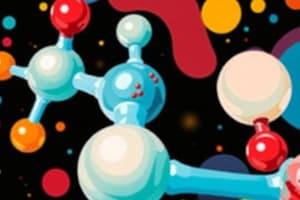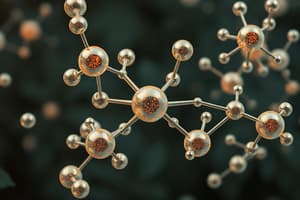Podcast
Questions and Answers
Organic chemistry is the study of silicon-based compounds.
Organic chemistry is the study of silicon-based compounds.
False (B)
Joseph Priestley, Friedrich Wöhler, and August Kekulé were pioneers in the field of organic chemistry.
Joseph Priestley, Friedrich Wöhler, and August Kekulé were pioneers in the field of organic chemistry.
True (A)
Biomolecules include proteins, nucleic acids, carbohydrates, and vitamins.
Biomolecules include proteins, nucleic acids, carbohydrates, and vitamins.
False (B)
Alcohols, carboxylic acids, alkenes, and alkynes are examples of functional groups in organic chemistry.
Alcohols, carboxylic acids, alkenes, and alkynes are examples of functional groups in organic chemistry.
Organic chemistry has its roots tracing back to the 19th century.
Organic chemistry has its roots tracing back to the 19th century.
Proteins are composed of nucleic acids.
Proteins are composed of nucleic acids.
Carbohydrates primarily serve as the structural components for living organisms.
Carbohydrates primarily serve as the structural components for living organisms.
Lipids are soluble in water but insoluble in nonpolar solvents.
Lipids are soluble in water but insoluble in nonpolar solvents.
Organic chemistry principles are not used in enzyme mechanisms and drug design.
Organic chemistry principles are not used in enzyme mechanisms and drug design.
Studying biomolecules like proteins and nucleic acids does not provide insights into biological systems.
Studying biomolecules like proteins and nucleic acids does not provide insights into biological systems.
Flashcards are hidden until you start studying
Study Notes
Exploring the World of Chemistry: Organic Chemistry and Biomolecules
If you're curious about the chemistry that surrounds us in everyday life and within our living cells, let's delve into the fascinating realms of organic chemistry and biomolecules.
Organic Chemistry
Organic chemistry is the study of carbon-based compounds, which are often found in living organisms and the products derived from them. This field has grown from the study of natural products to encompass a vast array of synthetic molecules, materials, and pharmaceuticals.
Organic chemistry's history dates back to the 18th century when it focused on the analysis and synthesis of natural substances. The foundational work of pioneers like Joseph Priestley, Friedrich Wöhler, and August Kekulé paved the way for the development of a systematic approach to understanding and manipulating organic compounds.
The field of organic chemistry is characterized by various functional groups, such as alcohols, carboxylic acids, alkenes, and alkynes. These functional groups enable the formation of bonds and reactions that provide the structural, chemical, and physicochemical properties of organic compounds.
Biomolecules
Biomolecules are organic compounds that serve essential functions within living organisms, including proteins, nucleic acids, carbohydrates, and lipids. Each of these classes plays a crucial role in maintaining life processes, such as growth, reproduction, and energy production.
-
Proteins: Proteins are large biomolecules composed of amino acids and are involved in various biological functions, such as serving as structural components, catalyzing chemical reactions, and acting as signaling molecules.
-
Nucleic acids: Nucleic acids, DNA (deoxyribonucleic acid) and RNA (ribonucleic acid), store genetic information and guide the synthesis of proteins. DNA provides the genetic instructions used in the growth, development, and reproduction of living organisms, while RNA carries out gene expression and other essential cellular processes.
-
Carbohydrates: Carbohydrates, such as glucose, starch, and cellulose, serve as the primary source of energy and structural components for living organisms. They are also involved in various biological processes, such as cell signaling and immune responses.
-
Lipids: Lipids, such as fats, phospholipids, and sterols, serve various functions, including energy storage, cell membrane structure, and signaling molecules. Lipids are insoluble in water but dissolve in nonpolar solvents.
The Intersection of Organic Chemistry and Biomolecules
The study of biomolecules in organic chemistry offers an integrated approach to understanding the structure, function, and interactions of these essential components of life. For instance, the understanding of enzyme mechanisms and drug design often involves the application of organic chemistry principles to study the interactions between enzymes and substrates, as well as the design and synthesis of new drugs and pharmaceuticals.
Similarly, the study of carbohydrates, lipids, and nucleic acids in organic chemistry provides insights into the structure and function of biological systems, enabling the development of new materials, drugs, and biotechnologies.
Conclusion
Understanding organic chemistry and biomolecules is essential for obtaining a comprehensive view of life and its essential components. Organic chemistry provides the foundation for understanding the structure and reactivity of biomolecules, while the study of biomolecules, such as proteins, nucleic acids, carbohydrates, and lipids, offers a deeper understanding of the complex biological processes that underlie life and health.
Studying That Suits You
Use AI to generate personalized quizzes and flashcards to suit your learning preferences.




